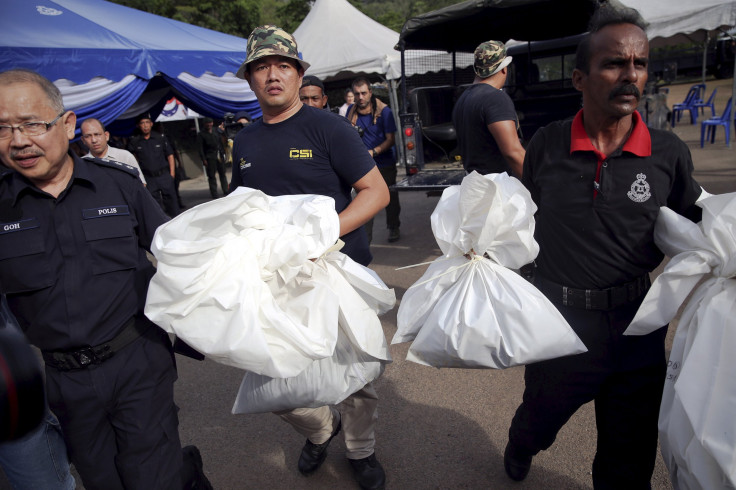Malaysia Finds 139 Suspected Migrant Graves In Over Two Dozen Human Trafficking Camps

Malaysian police officials have found 139 suspected migrant grave sites in 28 human trafficking camps, reports said Monday. According to authorities, the graves were found near sites used by people smugglers, where more shallow graves were found earlier this month.
The grave sites, which also revealed signs of “cruelty and torture,” have been discovered after Thailand began a crackdown against overland routes used by traffickers to move migrants across international borders in the region. Several foreign nationals and local villagers, suspected of trafficking people, have since been arrested from areas near the graves, after being linked to the discovery.
"It's a very sad scene... To us even one is serious and we have found 139," national police chief General Khalid Abu Bakar said, according to Reuters, adding: "We are working closely with our counterparts in Thailand. We will find the people who did this."
The latest discovery comes just a day after Khalid said that his officers had uncovered 28 suspected human trafficking camps about 500 meters from the northern Malaysian border.
Earlier this month, Thai police had found dozens of bodies in shallow graves on the Thai side of the border, pointing to hidden networks of jungle camps run by human traffickers, the Associated Press (AP) reported. The people smugglers had been using the jungles of Thailand and northern Malaysia to get impoverished migrants from countries like Bangladesh and Myanmar to Malaysia.
"We think the migrants were imprisoned in these wooden pens," Khalid said, according to AP, adding: "They were not allowed to move freely and traffickers kept watch at sentry posts." Khalid said, according to BBC, that the biggest camp could have held nearly 300 people.
Most of the migrants are believed to be from Myanmar's Rohingya community while others are believed to be Bangladeshi workers trying to find jobs in Malaysia. According to estimates by the United Nations, over 120,000 Rohingyas are said to have fled Myanmar in the last three years.
The traffickers are believed to charge anywhere in the range of $1,200 to $1,800 -- a fortune for the impoverished migrants -- to ferry them across borders. After the crackdown on overland routes, the traffickers reportedly switched to transporting thousands of migrants in flimsy boats across the Bay of Bengal and the Andaman Sea, only to abandon them at sea, creating a massive humanitarian crisis. Eventually, Malaysia and Indonesia have agreed to bring the stranded migrants ashore and provide shelter for a year, after appeals by international agencies.
On Friday, the United Nations High Commissioner for Refugees (UNHCR) had reiterated its appeal to save over 3,500 migrants, who were still stranded at sea on overloaded vessels. Indonesia's National Disaster Mitigation Agency said Sunday that it will begin the repatriation of 720 Bangladeshis over the next month, and added that the cost would be taken care of by the UNHCR and the International Organization for Migration, Reuters reported.
© Copyright IBTimes 2024. All rights reserved.












